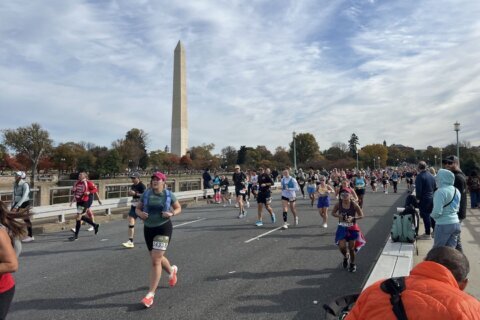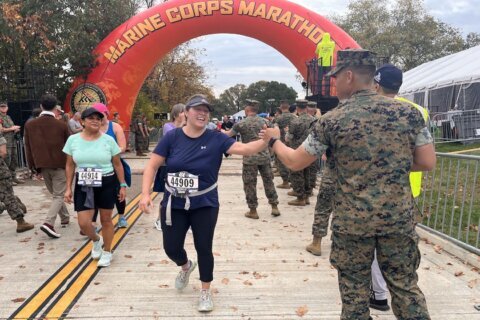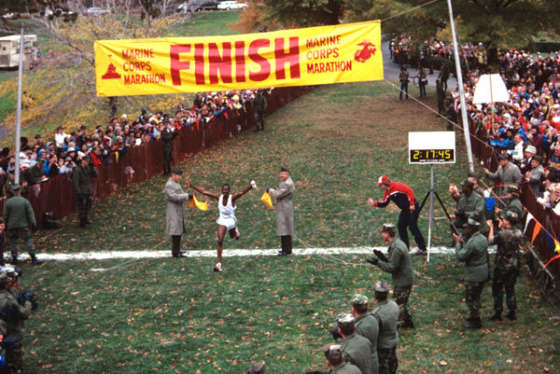The 44th Marine Corps Marathon debuts an ultramarathon this year, the MCM 50K race. Who wants to run an extra 4.8686 miles on top of the marathon’s 26.2? Some 1,700 runners do and are set to participate in the inaugural event.
- What’s a 50K?
- Where and when are the road closures?
- Where can you watch and cheer?
- How will the MCM 50K differ from the marathon?
- What’s unique about the MCM 50K?
- How do you train for an ultramarathon?
- Why would you want to run an ultramarathon?
Marine Corps Marathon spokesman Marc Goldman said that there has been an interest in runners to go beyond the marathon distance to continue to challenge themselves.
“Ultramarathons are a way for those who have accomplished the goal of running a marathon to continue to run with the Marines, but with a new challenge,” he said.
When registration for the MCM 50K opened, all 1,700 slots sold out in less than an hour, Goldman said.
What’s a 50K?
Yes, 50 kilometers is a good, round number for a race, especially if you love both running and the metric system. But in Imperial or English units, from which U.S. customary units are derived, that is 31.0686 miles. Let’s round that to 31.07 miles.
What constitutes an ultramarathon? Ultrarunning magazine said that the standard definition is anything past the marathon, but the shortest standard distance that is considered an ultra is 50 kilometers, which makes the Marine Corps Marathon’s 50K an ideal way to get that ultramarathoner label under your belt.
Other standard distances are 50 miles, 100 miles, 100 kilometers and events that are timed from six hours to a mindboggling six days.
Where and when are the road closures?
Roads will begin to close at 3:30 a.m. Sunday. All routes will reopen by 5 p.m.
Since MCM 50K participants veer of toward Canal Road, portions of the road are closed.
- Canal Road NW from M Street NW to Arizona Avenue NW is closed from 6:30 a.m. to 10:30 a.m.
- M Street NW from Canal Road NW to Wisconsin Avenue NW is closed from 6:30 a.m. to noon.
See the detailed list of closures.
Where can you watch and cheer?
You can watch runners from as many as five locations on the course, according to the MCM website. With several roads closed in D.C. and Virginia, consider ways to get around other than driving.
Here are the spectating suggestions from the race organizer:
- You can watch from the start line on Route 110 in Arlington, Virginia. You can get to this location by the Rosslyn or Pentagon Metro stations.
- After the start of the race, you can stroll across Arlington Memorial Drive to the Lincoln Memorial.
- Then head east on Independence Avenue toward the National Mall.
- Next stop is a Metro ride from the Smithsonian station to Crystal City, where there is also the Crystal City Family Festival.
- Finally, head over to the Marine Corps War Memorial and the finish line.
Or, Goldman said, you can download an app that lets you track runners with live updates throughout the race. So, if you are cheering on a friend who tends to “hit the wall” at mile 18, you will know exactly when to get your encouraging sign to mile 18 to boost their spirit.
How will the MCM 50K differ from the marathon?
Aside from the extra mileage, the 50K will start at 7:30 a.m., 25 minutes earlier than the marathon, which has a gun time of 7:55 a.m.
Between mile 4 to 4.5, 50K participants will diverge from the marathon course on the D.C. side of the Key Bridge. They will then run the additional 4.8 miles or so out and back along Canal Road.
They will return to the marathon course along M Street (mile 10 for them and mile 4.5 for the marathoners).
See the course map for the 50K.
Ultramarathoners will finish in the same spot as the marathoners, at the U.S. Marine Corps Memorial in Arlington, but they get a different medal. Marine lieutenants will present a “special and unique medal” to 50K finishers, according to the MCM website.
How will you know to cheer for the ultramarathoners instead of the other runners? First of all, cheer for all the runners. Second of all, MCM 50K participants will have a different bib color.
One thing only the 50K runners get that others will not is a “sweet spot station.” Because they need to load up for their longer run, Goldman said that 50K participants will be provided baked goods and sweet items during the race.
What’s unique about the MCM 50K?
With 1,700 runners signed up — including running celebrities Dean Karnazes and Arlington, Virginia’s, Michael Wardian — the MCM 50K will be the largest ultramarathon in the country, Goldman said.
This is really an urban ultramarathon, MCM operations manager Bret Schmidt said. Most ultramarathons take place in trails in the countryside or parklands, “where you have no spectators; you have aid stations every 5 to 10 miles,” Schmidt said.
Instead of a long, solitary run in the middle of the woods, MCM 50K runners will have a crowd cheering them on for most of the 31.07 miles, water stations every two miles, and a cadre of marines supporting them.
“I think it’s going to be a unique experience, plus to be able to run in the nation’s capital on closed roads and protected by local law enforcement agencies,” Schmidt said.
How do you train for an ultramarathon?
“The first thing you want to do is make sure your general health is good,” said Dr. Wiemi Douoguih, director of sports medicine at MedStar Orthopedic Institute at MedStar Washington Hospital Center.
The next thing you should do, he said, is to have a plan for how you are going to build up over time.
“You want to train consistently, and you want to build up gradually so you avoid injury,” Douoguih said.
More Marine Corps Marathon stories
Jennifer Watson, of Tampa, Florida, has run several marathons but the MCM 50K will be her first ultramarathon. Her training includes long runs on weekends and short runs on weekdays. In addition, she cross trains by teaching spin classes three days a week, weight lifting and swimming.
Leah Pan, of D.C., has done an ultramarathon before, but this is her first since giving birth. At the peak of her training, she will build up to an average 50 miles a week for three weeks.
Watson and Pan both have jobs, and they said they log their runs early in the mornings. They are also very careful to prevent injury.
Injury prevention
“If you suddenly decide to go on a 20-mile run when all you’ve been doing is two or three (miles), you may predispose yourself to injury. So, you want to be careful,” Douoguih said.
You want to avoid spikes in your training, so in other words, you want to have a gradual build up over time, he said.
Douoguih said that one of the main causes of injury is a prior injury, so understanding whether an injury is healed before you go out and engage in another activity is critical.
Watson said that she is very cautious, and if anything starts to bother her, she tries to back off a little and let it rest before getting back in to the program.
Pan does a bit of foam rolling and uses a lacrosse ball to massage any spots in her glutes and quads that feel tight. “And if I’m tired during any part of the run, I’ll actually be happy to walk,” she said.
But one thing Douoguih said you should not run through is pain.
“It’s one thing to have a cramp that goes away after 30 seconds, but if you have a pain in your leg or your foot, or somewhere else in your lower extremity that just doesn’t go away and continues throughout your training, you should probably stop and get evaluated by your physician,” he said.
Recovery
If you’re going to run an ultramarathon, there are changes that happen to your body that may be slightly different from running shorter races. Not only will you have to train differently, but you also have different nutritional needs.
“For example, when you’re running a race that’s 50 miles or more, you may lose more salt and have to replenish the salt, not just the fluid, in the ways that you would if you’re running a shorter race,” Douoguih said.
After finishing a race, such as the 50K, a period of active rest is critical, particularly if you’re planning to run again in the near future.
“You need to allow yourself to recover. You need to replenish, not only fluids, but other nutrients that may have been depleted, such as sodium, potassium, magnesium, during the course of the run,” Douoguih said.
He also suggests cross training and activities other than running to give your body some rest from the pounding during the course of the race.
And lastly, “Enjoy the fact that you’ve accomplished your goal,” Douoguih said.
Why would you want to run an ultramarathon?
Watson has done nine marathons before, and she was looking for a new challenge. She decided that the MCM 50K is a good way to start because, “it’s only five miles extra,” she said.
Watson said that breaking down her mileage during long races helps her get through it. “I think, ‘Oh I can do it; it’s only five more.'”
Pan has done ultramarathons before, but this will be her first since giving birth.
“Believe it or not, 50K is not much more than a marathon,” Pan said. “It’s really only 4.8 miles more. When you’re going 26 miles, what’s another five?”
In fact, she has done a 100-miler. That’s 161 kilometers for those of you who prefer the metric system.
So why would these women, who have several long-distance races under their belts already, want to do one more long race?
“It’s all about the people. It’s the people you run on the trail with. Or during a race, you’ll end up chatting with the person next to you and making new friends,” Pan said. Some of these people who she met while ankle-deep in mud in the middle of the woods have become her best friends.
The MCM 50K, Pan said, will only be 5 or 6 hours of hanging out with a new friend.
For Watson, finishing the 50K will be emotional, as every marathon has been for her.
As a child, she had hip dysplasia, and said that she felt held back by a one of her doctors from doing athletic activities.
“It’s amazing to me that I’ve done nine marathons,” Watson said.









